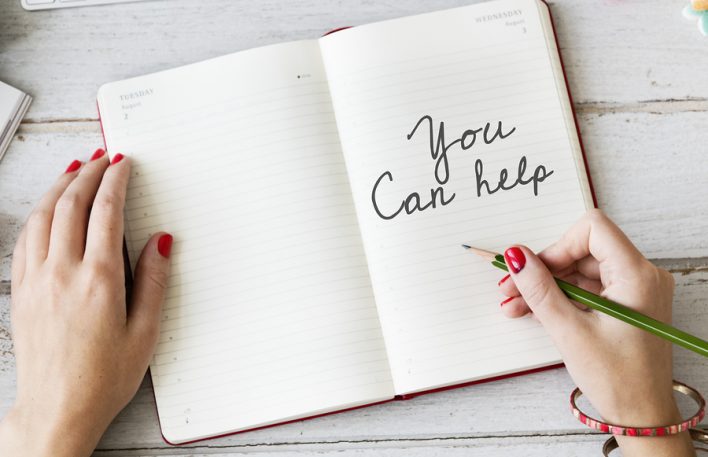Advice
Asking for help
By: Cynthia Ebere-Anaba
Updated: 07 April 2017

Ever heard or said the following: “Ah, sure I’ll be grand”, “Don’t bother, I can handle it”, “Feelings? Nope, I don’t want to talk about it”, “It’s my burden to carry”, “I don’t want to bother them”, “I don’t need help.”
Yes? Well you aren’t alone in that.
Today is World Health Day and the aim of this day is to raise awareness on different health issues. This year’s theme is “Depression: Let’s talk”. The goal of this theme is to get more people with depression to both seek and get help. Therefore, it is important that we address our issue with asking for help especially when it has to do with our mental health.
According to the WHO, it is estimated that 4.4% of the global population suffer from a depressive disorder, and 3.6% from an anxiety disorder.
However, studies show that we don’t ask for help because we assume it is a burden to others or we are scared of what they will think of us. In asking for help, we usually think that the costs outweigh the benefits, however, “No one is an island” and we are all interconnected.
We live in a world where we have all learned to be independent and carry our pain on our own, only asking for help when we are really stuck or at the very last minute. This can be a good attitude to have in some situations but there are limits.
Asking for help does not mean you are weak or incapable of handling things but rather, it means that you understand who you are and are honest about what you can and can’t handle. This is a brave thing to acknowledge. While asking for help can often leave us feeling vulnerable, it also leaves us open to new, stronger relationships that can help us be more creative and successful.
Allowing someone to help you gives that person a sense of purpose and brings relief to both you and them. As Warrell (2015) said “we all have gifts to share – time, talent, connections, insights, experience, skills, resources, hospitality. And most people love to share them”. So why not reach out to those around you?
Why ask for help?
Well, the truth of the matter is there is no right time to ask for help. It is up to the individual but it is always better to ask sooner rather than later. No concern is too small to be voiced. As they say, you will never know until you ask and “Better to know and be disappointed than to never know and always wonder” – Unknown.
Here are some tips about asking for help:
- Accept that you need help
- Figure out what you need help with
- Find the right help you need – whether it’s in a friend, mental health professionals, colleague or family member. People like to help and you have the right to get help so don’t feel bad for asking.
- Be honest and straightforward
- Don’t be afraid to seek professional help. Mental health professionals are trained to provide support for those struggling with different life challenges.
Remember, it takes time and realizing that it’s time to ask for help can be hard. Getting answers and working through them can take even longer and processing them can be even harder. But asking for help often reveals a strength that you never knew you had. We all need help sometimes, and learning how to get help is worth it.
So whether you’re struggling with asking for help, need someone to lend you a hand, or you just need to borrow an ear. If you need to talk to a member of our team, please get in touch by calling 076 680 1060 or email hq@mymind.org.
Remember, “We can all do so much more together than we ever can alone” (Margie Warrell).
By MyMind Intern Cynthia Ebere-Anaba
MENTAL HEALTH PROFESSIONALS WORKING WITH Anxiety ISSUES:
Approach: Cognitive Behavioural Therapy (CBT) , Gestalt Therapy , Humanistic & Integrative Psychotherapy , Psychodynamic Therapy , Solution-Focused Brief Therapy , Other , Person-Centred Therapy
Works with: Individual Session
Specialities: Anxiety , Bereavement / Loss , Depression , Domestic Violence / Abuse , Isolation / Loneliness , Personal Development , Relationship issues , Self-Esteem , Sexuality (LGBTQIA+) , Stress , Suicidal Ideation / Self Harm , Work Issues, Work/Life balance , Other
Next avaialble appointment: 12:00 24 February 2025
Approach: Mindfulness , Person-Centred Therapy , Somatic Experiencing , Internal Family Systems , Other
Works with: Individual Session
Specialities: Anger , Anxiety , Bereavement / Loss , Depression , Eating Disorder / Body Image , Fertility , Isolation / Loneliness , Personal Development , Relationship issues , Self-Esteem , Stress , Trauma , Work Issues, Work/Life balance
Next avaialble appointment: 13:00 24 February 2025
Approach: Psychodynamic Therapy , Humanistic & Integrative Psychotherapy
Works with: Individual Session
Specialities: Anger , Anxiety , Domestic Violence / Abuse , Personal Development , Relationship issues , Self Care , Self-Esteem , Stress , Trauma , Work Issues, Work/Life balance
Next avaialble appointment: 12:00 24 February 2025
NEXT ARTICLE
MyMind Video Series: Maureen Finucane
Search
Get The Support You Need
From One Of Our Counselors
News
Isolation
Anxiety
Depression
Relationship Issues
Counselling
Personality Disorder
Addiction
Trauma
Children and Adolescent
Anger
Bereavement
Chronic Illness
Communication Issues
Eating Disorder
Post natal depression
Stress
LGBTQI+
Panic Attack
OCD
Resilience
Parental support
Men's Mental Health
Category List
All Posts
News
Isolation
Anxiety
Depression
Relationship Issues
Counselling
Personality Disorder
Addiction
Trauma
Children and Adolescent
Anger
Bereavement
Chronic Illness
Communication Issues
Eating Disorder
Post natal depression
Stress
LGBTQI+
Panic Attack
OCD
Resilience
Parental support
Men's Mental Health

